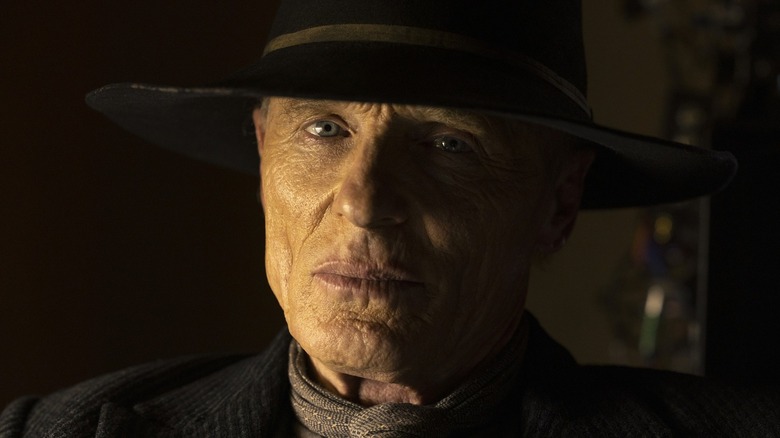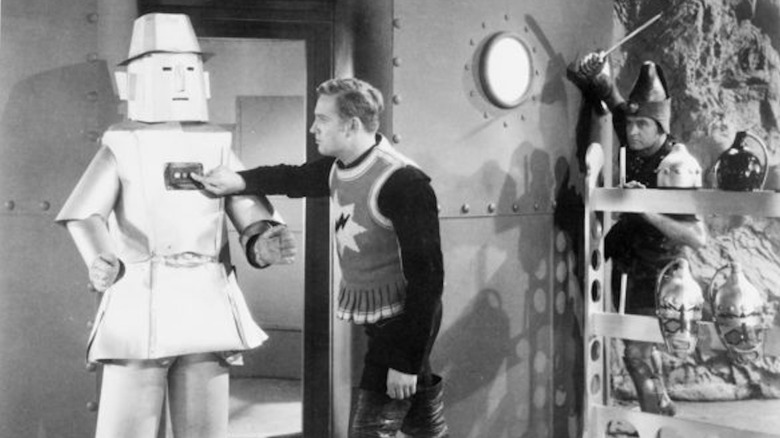The Classic Sci-Fi Western That Paved The Way For Westworld And Firefly
As Hollywood acclimated to the talkie era in the early 1930s, studios leaned heavily on the aural majesty of musicals and the rat-a-tat bliss of screwball comedies to dazzle audiences. The future of motion picture entertainment had arrived almost overnight, and filmmakers were fairly certain they knew what moviegoers wanted to hear. When it came to non-spoken sound, people lined up to hear bullets bang and whiz in both gangster movies and Westerns; they were blown through the back of the theater by the ferocity of King Kong's roar and scared silly by the screams of Count Dracula's victims.
The still young science-fiction genre should've thrived in the early sound era, but the studios and the public generally viewed the dream-big tales of Jules Verne, H.G. Wells, and Edgar Rice Burroughs as kids' stuff. Though Fritz Lang's 1927 silent film "Metropolis" is viewed today as a medium-altering masterpiece, critics of the day found it silly and/or leaden. They were equally unimpressed with William Cameron Menzies' astonishing "Things to Come," a Wells adaptation that many critics and film historians believe to be the first great sci-fi feature.
For this reason, science-fiction was generally relegated to the world of serials, which unfolded in 20- to 30-minute weekly chunks and employed audacious cliffhangers to lure audiences back for the next installment. Adolescents blew their allowances to keep up with the big screen exploits of Flash Gordon and Buck Rogers, then spent the week in between chapters wildly speculating with their friends as to how the hero would escape certain death.
Serialized Westerns were also huge with young moviegoers, which did not escape the notice of film actor, writer, and producer Wallace MacDonald. If some enterprising scenarist could somehow dream up a Western with a sci-fi conceit, they might just be sitting on a box office goldmine. But it wasn't until MacDonald found himself under the influence of laughing gas whilst getting a tooth pulled that he figured out how to successfully mash the two genres together — an approach that, many decades later, would fire the imaginations of Michael Crichton and Joss Whedon.
The Phantom Empire threw a delightfully unexpected curve ball
"The Phantom Empire" is one of the best serials of its era because it plays exactly like the kind of improbable yarn a bored schoolkid would daydream during algebra class. It also has the profound good fortune of being the first star vehicle of country singer Gene Autry, whose singing cowboy act would turn him into a matinee idol.
The serial kicks off with a seeming stagecoach heist that winds up being the opening of Autry's radio show. The community adores him, but no one loves him more than teenagers Frankie Darro and Betsy King Ross, who, in their free time, play a game of make believe as Junior Thunder Riders. The Riders are based on a legend of a secret civilization that exists deep underground. In the first chapter, Autry and the kids learn that the Thunder Riders are no myth as they're kidnapped and plunged some 18,000 feet beneath the soil. There, they find themselves at the imperious mercy of Queen Tika, the ruler of Murania.
Over 12 episodes (which, combined, run an expansive 245 minutes), Autry and the kids must contend not only with Tika but also with marauding topside criminals hot to steal Murania's radium wealth and insurgents eager to overthrow the queen. Is it silly? Gloriously so. Its futuristic sets are still nifty in an old-school backlot fashion, and the matte paintings work magnificently at plunging us into this richly imagined world. "The Phantom Empire" is so irresistibly entertaining that, as a child, I fell hard for the downsized version of the tale when the 1979 CBS anthology series "Cliffhangers" ripped it off as "The Secret Empire." (You can currently watch the whole season on YouTube.)
There's definitely not a chance that Michael Crichton's "Westworld" and Joss Whedon's "Firefly" would exist without MacDonald's dentist-chair dream. This is also true of Jon Favreau's "Cowboys and Aliens," but let's not put that evil on "The Phantom Empire."

